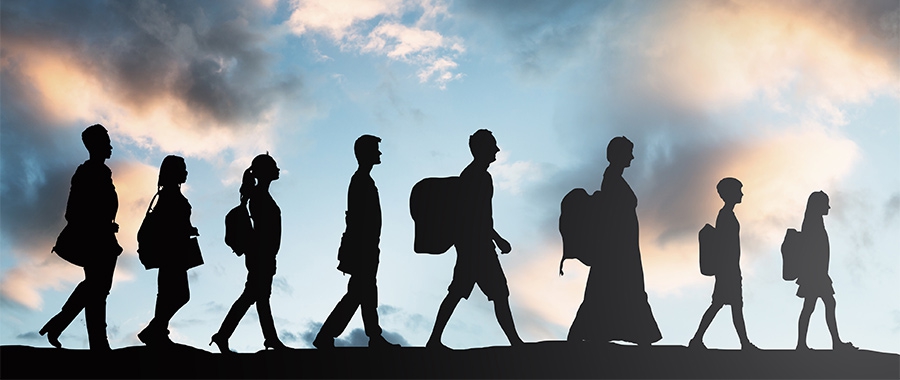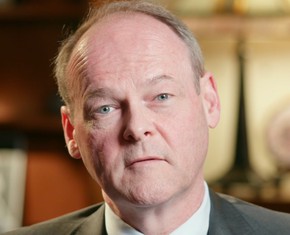The views expressed in our content reflect individual perspectives and do not represent the authoritative views of the Baha'i Faith.
From the moment I arrived in the United States as an immigrant from Iran, I had the feeling of being foreign – I was inside the country but outside the society.
I had arrived after escaping from Iran with a few pairs of billowy, “Ali Baba” style pants, canvas underwear made by my mother, an unsightly large black coat, pistachios, and hair gel – because I feared not finding any in the new country.
As a foreigner, I even came to dislike my name. My father had named me Hussein because his name was ‘Baha’, a name that had caused him great difficulties when it came to employment in Iran, where prejudice against Baha’is ran high.
In the United States, though, Hussein sounded Arab and Muslim and marked me as different, so I often used American names like David. Later, my marriage certificate listed me as “Jimmy Ahdieh.”
As a foreigner, though, I did make friends. Not everyone received me with an equal amount of warmth, openness and hospitality, but some certainly did – and I often felt what Abdu’l-Baha experienced during his visit to the U.S. and Canada half a century earlier:
The standard of liberty is held aloft in this land. You enjoy political liberty; you enjoy liberty of thought and speech, religious liberty, racial and personal liberty. Surely this is worthy of appreciation and thanksgiving. In this connection let me mention the freedom, hospitality and universal welcome extended to me during my recent travels throughout America. – Abdu’l-Baha, The Promulgation of Universal Peace, p. 390.
During my first Thanksgiving, I was invited to the home of an American family whose daughter was a classmate. Following the Persian custom of tarof, I declined the offers of food even though I was hungry. Persian politeness demanded that an offer be turned down a few times before being accepted, so as not to appear greedy and disrespectful of the other person. But I was in the US, and my American hosts took my response at face value. They continued the meal without me while I sat and watched TV, feeling so confused and so hungry that I ate the entire bowl of nuts on the table in front of me while the family ate a sumptuous Thanksgiving turkey dinner.
Even though I was a university student, my English remained at the level of a low-wage restaurant worker, while I was gradually forgetting Persian, my mother tongue. My son would later say that I was illiterate in two languages. My friends and co-workers were all foreigners: Italian waiters, Greek cooks, Puerto Rican dishwashers and Persian students. I had a Yugoslavian roommate who was happy just to be working as a busboy in the US, which saved him from the poverty he had experienced in his home country. He was enamored of American wealth; he often asked me what I thought Rockefeller was doing that day.
On the one hand, I wanted to be more like American young men. I saw them with young women always having fun, but my few English phrases were insufficient to communicate with young women in any way that I didn’t come across like an awkward outsider.
In Iran, my social world had been mostly family. These casual and relaxed relationships between men and women in the U.S. seemed entirely foreign to me. But in America, my social world limited itself to school, the kitchens where I worked and the four book-lined walls of my rented room.
At Fairleigh-Dickinson University, in the early 1960s, I studied electrical engineering, a traditional field for a young Persian man. My real interest, though, was in the humanities, especially history, philosophy and literature. I applied to the New School in Manhattan, which had been founded at the turn of the century to carry out research that could then be applied to the social problems of the day and to educate the average citizen in these issues. Its faculty had included some of the finest minds of the period, including Franz Boas, John Maynard Keynes and Margaret Mead. I wrote an essay on Thoreau’s On Walden Pond, for my application, but my impoverished English was evident in my writing and I was not accepted. I was able to complete my bachelor’s degree in Engineering at the New York Institute of Technology by 1968, and did eventually get a degree in the humanities – a master’s degree in European Intellectual History from Fordham University – a few years later. I also found myself turning more to my Faith.
My first encounter with the American Baha’i community happened in New Jersey. I lived in Teaneck, a racially diverse suburban town half an hour from Manhattan. Teaneck had voluntarily desegregated its public schools in the mid-’60s. Roy Wilhelm, a Baha’i in the coffee business, owned a home there with a grove of trees down the hill. Behind his house he built a rustic cabin, roughly in the shape of a ship because he loved the sea. Every year, Baha’is gathered on the property to commemorate the unity feast and talk given there by Abdu’l-Baha during his visit in 1912. In his talk that day, Abdu’l-Baha said:
You must be exceedingly kind and loving toward each other, willing to forfeit life in the pathway of another’s happiness. You must be ready to sacrifice your possessions in another’s behalf. The rich among you must show compassion toward the poor, and the well-to-do must look after those in distress. … Your utmost desire must be to confer happiness upon each other. Each one must be the servant of the others, thoughtful of their comfort and welfare. In the path of God one must forget himself entirely. He must not consider his own pleasure but seek the pleasure of others. He must not desire glory nor gifts of bounty for himself but seek these gifts and blessings for his brothers and sisters. It is my hope that you may become like this, that you may attain to the supreme bestowal and be imbued with such spiritual qualities as to forget yourselves entirely … – Abdu’l-Baha, 29 June 1912, from a talk given at the unity feast in Teaneck, New Jersey, in The Promulgation of Universal Peace, p. 215.
The American Baha’is, I soon learned, were less formal in their approach to Baha’i meetings and prayers than the Baha’is in Iran, but very earnest in their devotion. The level of commitment and devotion of these Americans to the Faith inspired me, especially when I considered the temptations that were everywhere in this liberal and fast-moving society.
So I soon made close friends among the Baha’is, and no longer felt like a stranger in a strange land. It struck me that I belonged to a global Faith, one that offers a wide embrace from a worldwide community:
We do not consider anyone a stranger, for it is said by Baha’u’llah “Ye are all the rays of one sun; the fruits of one tree; and the leaves of one branch.” We desire the true brotherhood of humanity. – Abdu’l-Baha, Abdu’l-Baha in London, p. 80.
















Comments
Sign in or create an account
Continue with Googleor